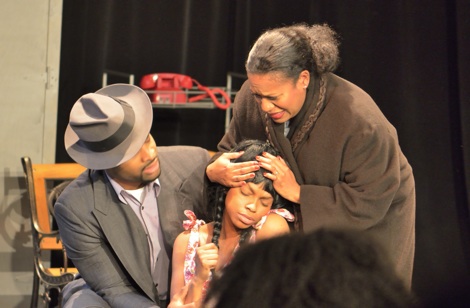From left to right: John Cannon portraying David Lacks, Tiffany Nichole Green portraying Elsie Lacks, and Tara Taylor portraying Henrietta Lacks.
While returning from a trip to North Carolina a few years ago, Dr. Cynthia Stephens desperately searched for something to read on her flight back to New York, so she headed to an airport bookshop.
There, she “definitely judged a book by its cover,” she recalled in a recent phone interview.
Dr. Stephens was enticed by the book’s vibrant orange cover, and its picture of a Black woman. It was “The Immortal Life of Henrietta Lacks” by Rebecca Skloot.
Soon after reading the book, Dr. Stephens couldn’t stop dreaming about the story of Henrietta.
“As soon as I finished the book, I started writing,” she said of what turned out into her play, “Painted Red” which concluded a successful off-Broadway run at Shelter Studio 54, on April 24th.
Even though Dr. Stephens has written many plays, including musicals, it only took her about four months to write Painted Red, the fastest one she’s ever written, given how absorbed she’d become in the story.
It’s a painful and tragic story of exploitation and experimentation that sadly man people aren’t even aware of.
Painted Red tells the story of Henrietta Lacks, a woman from Baltimore who during the 1950’s became the source of what is now known as the HeLa cell line.
After becoming ill, Henrietta was diagnosed with cancer, and received treatment at Johns Hopkins, the nearest place where people of color could be treated in those days. During radiation treatment for her cancer, without her knowledge both healthy and cancerous tissue was sampled from Henrietta’s cervix.
Scientists were later amazed to discover that Lacks cells could reproduce and stay alive for long unlike all other known cases. These cells became the immortal HeLa cells that were discovered through ongoing secret experimentations.
After cancer spread through her body, Henrietta died but her cells continued to be cloned during 40 years for medical research, making huge profits for John Hopkins. There are 11,000 patents related to HeLa cells.
It was only after receiving a phone call from a John Hopkins scientist who was seeking blood samples from the family, that the Lacks eventually discovered that Henrietta’s cells had been cultivated for decades.
Although the National Institute of Health refused to give monetary compensation to the Lacks, they now need permission from the family to use Henrietta’s
cells.
As for Stephens own mission to spread the story through her play, she recalled an interesting encounter. “It was an odd, odd experience,” she said.
One day she was in a conversation with a lady who said to she was psychic, and, without any way of knowing it, told Stephens that she was writing a
play about Henrietta Lack, and that she needed to write faster.
“My blood ran cold, I kept having weird dreams,” she recalls. How could she not quickly finish the play after that? “It was just a wild, and crazy ride.”
After some revision, Dr. Cynthia Stephens won an award to have a reading of Painted Red at the LaGuardia Performing Arts Center, which followed other revisions and more readings; one at the Kennedy Center. After finding her director, Nathaniel Stampley, and her 17-member cast, the 75-minute play “just worked,” she said.
“My whole mission was to give voice to the family, so I stayed really close to what they actually said,” using The Immortal Life of Henrietta Lacks as a reference, she said. “People were shocked to find out it was a real story.”
Painted Red went through extraordinary hurdles, from before production started, to its impactful last shows. First, Tara Taylor, who played Henrietta Lacks was four months pregnant when rehearsals began. “Tara gave Henrietta’s character so much depth and innate beauty that I had no choice” but to let her play the character through the end of the play’s showing, Dr. Stephens later confided.
Kevin Gordon, who played Dr. Howard Jones in the play, tracked down the real Dr. Jones (who found Lack’s tumor), for a phone interview detailing his experiences with Mrs. Lacks. Dr. Jones was Henrietta’s gynecologist and at 103, gave a very lucid account of his relationship with his patient, which greatly impacted the cast.
(It was another doctor, George Otto Gey, who harvested Lacks’ cells).
Jamyl Dobson’s portrayal of Zakariyya Lacks, described as an angry and dangerous man, “produced a silence wherein one could hear a pin drop in the theatre,” Dr. Stephens said in a follow-up email message.
Other actors like Tony Robinson, who played The Old Black Man who told the stories of the Klan’s costumes, and the Night Doctors who came at night to steal slaves for medical experimentation, also greatly impacted the audience. Michael Broadhurst’s portrayal of Dr. Christoph Lengauer, “engendered a profound compassion that gave succor to unimaginable injustice,” said Dr. Stephens.
Jerri Lacks, granddaughter of Henrietta, drove up from Baltimore with her husband to see the play. “There was not a dry eye in the cast, they were all crying,” said Dr. Stephens.
She was initially very afraid that Henrietta’s family might be offended by the play. “Some of it was quite rough,” but Jerri welcomed the honor of having her grandmother’s story heard, she said.
Dr. Stephens recalled how Jerri Lacks said: “I smiled, and I’m still smiling because it was so real.”
Dr. Ronald Patillo of Morehouse School of Medicine, who is responsible for introducing Rebecca Skloot to the Lacks family, also attended a show.
Dr. Stephens funded Painted Red all on her own through her arts agency Sacred Ground Productions LLC that she founded in 2007. As noted on its website, the company is “dedicated to creating a forum for people of African descent to tell their own stories from their own perspectives,” through performing arts.
“I’m trying to tell the truth about the good and the bad in our own culture,” she said.
Painted Red ran for two weeks, and with the exception of Easter ran full house every night.
“I think that these plays that deal with African American history should really have the voice of the people who lived this history,” which is why she started the company, she said.
“We should be writing ourselves about what that history is. In a lot of ways my mission was accomplished, because I gave this family a voice.”







